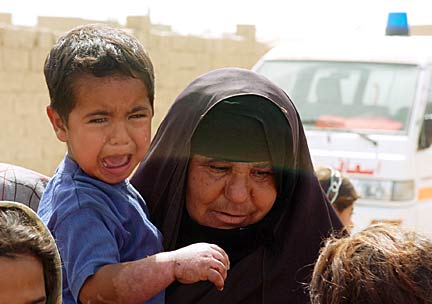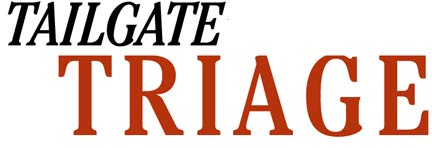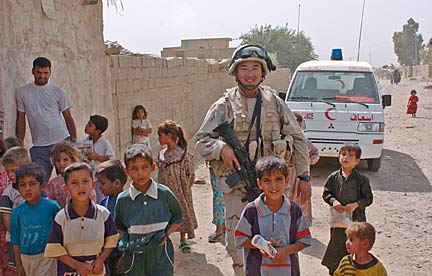
|

Hawaii-based troops work
with Iraqi soldiers to bring
medical aid to villagers
LSA ANACONDA » Medical teams from the Iraqi army and Company C, 29th Support Battalion, 29th Brigade Combat Team of the Hawaii Army National Guard visited the Iraqi village of Al-Faduz on July 5, providing much-needed assistance to residents. Al-Faduz is a farming village located less
than three kilometers from Logistics Support Area Anaconda's southern border.
Much of the security for this joint mission was provided by solders from the Iraqi army's 4th Battalion. These soldiers have been trained by Task Force Konohiki, part of the Hawaii Army National Guard's 29th Brigade Combat Team. The Iraqi soldiers worked alongside soldiers from the Wisconsin Army National Guard's 1st Battalion, 128th Infantry to secure the village's main street, where medical assistance would be provided. Iraqi medics who had been trained by medics from the 100th Battalion, 442nd Infantry worked in concert with medical personnel from the Hawaii Army National Guard's Company C, 29th Support Battalion to set up a triage as well as two treatment areas on the unpaved, dusty street.
Once security was in place, Iraqi army soldiers put out the word to the villagers that Iraqi and U.S. medical personnel were there to help them, and the word spread through the approximately 500 residents with amazing speed. Within minutes of the team's arrival, the street was swarming with dozens of onlookers as well as people seeking medical assistance -- and more kept coming. The combined medical team set up a triage table where villagers lined up and received an initial evaluation.

Hawaii National Guardsman Capt. Kyle Yonemura, below, is surrounded by young patients in the village of Al-Faduz.
Iraqi Army medics along with physician's assistants and medics from the 29th Support Battalion set up two exam areas where they began treating patients who reported ailments ranging from minor cuts and toothaches to flu symptoms and infections.
"We even did one minor surgery," said Capt. Roy Ouano, a physician's assistant with 10 years of civilian experience. The medical personnel from Hawaii worked with Iraqi medics to provide what Ouano described as "tailgate medicine" -- an apt name, as the soldiers worked out of the backs of open Humvees.
"I'm very proud to be helping other Iraqis," said Muhamad, an Iraqi medic. "The people are very happy to see an Iraqi soldier helping them, and they look up to me."
Muhamad requested that only his first name be used, as insurgents have killed the family members of Iraqi army soldiers in the past. He sees his unit as being "almost ready" to take over the security of the area from American forces. He credits the high morale of his unit with the "improved conditions in the Iraqi army."
As the crowd of people wanting to be seen by the medical team grew to well more than a hundred, Iraqi soldiers attempted several times to get the villagers to form a neat line; however, the excited villagers pressed up against one another so tightly that the line kept collapsing and returned to its original state -- a large and excited group thronging the tables.
"This is awesome!" said medical Staff Sgt. Matthew Mitsui through a smile. "This is what we came to do."
Mitsui is an active-duty guardsman from Oahu. According to Sampaga, the nurse from Hilo, the Iraqi-U.S. medical teams were able to treat about 160 people in a two-hour period.
"This is very fulfilling and worthwhile!" said Sampaga.
Missions such as this medical assistance visit are part of ongoing civil-affairs efforts by area commanders aimed at changing the way the local populace feel about their multinational neighbors on LSA Anaconda. According to Cpt. Hallah Nilsen, who helped coordinate the medical visit, Al-Faduz has been used as a mortar-launching point into the base. Efforts such as medical outreach are aimed at changing some of the villagers' attitudes toward the multinational forces.
My favorite president, Abraham Lincoln, once asked the rhetorical question, "Am I not destroying my enemies when I make friends of them?"
In the kind of war we're fighting here in Iraq, I believe that medical assistance visits such as this one in Al-Faduz are among the best ways to "fight" and win. Even the most hardened faces in the village broke into smiles when they saw their children receiving medical assistance from caring hands.
As the mission wrapped up and the soldiers left the village, smiling and waving Iraqis stood along the dirt road to wave goodbye. Large smiles were on the faces of the Hawaii soldiers, too.
"This was very rewarding," said Mitsui.
[News] [Business] [Features] [Sports] [Editorial] [Do It Electric!]
[Classified Ads] [Search] [Subscribe] [Info] [Letter to Editor]
[Feedback]
